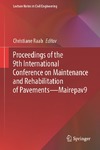Identificador persistente para citar o vincular este elemento:
https://accedacris.ulpgc.es/jspui/handle/10553/74413
| Título: | Ultrasound monitoring and microwave self-healing of top-down cracks in asphalt pavements | Autores/as: | Franesqui, Miguel A. Yepes Temiño, Jorge Gallego, Juan |
Clasificación UNESCO: | 251107 Ingeniería de suelos 251111 Génesis y morfología de suelos 2506 Geología |
Palabras clave: | Crack Depth Industrial Waste Metallic Addition Microwave Self-Healing, et al. |
Fecha de publicación: | 2020 | Editor/a: | Springer | Publicación seriada: | Lecture notes in civil engineering | Conferencia: | 9th International Conference on Maintenance and Rehabilitation of Pavements (Mairepav9) | Resumen: | Surface-initiated cracking with top-down propagation (TDC) is one of the most frequent and important failure modes of asphalt pavements. In order to achieve long-lasting pavements, it is necessary to control the evolution of these cracks and so repair them before they become deeper and deteriorate the lower layers. Self-healing of asphalt mixtures is possible if the temperature is raised near the softening point of the binder, thus allowing the fusion of the cracks. For this purpose, conductive additions can be used to promote induction heating when applying electromagnetic fields. This laboratory work shows the self-healing results of TDC on bituminous mixtures after microwaves exposure. Different mixtures (semi-dense asphalt concrete AC-S, gap-graded asphalt concrete for very thin layers AC-VTL and porous asphalt PA) with diverse types, sizes and proportions of metallic additions from industrial waste were tested. Three aspects were studied: (a) analysis of the type, particle size and content of each addition on the heating speed; (b) temperature increase with the specific energy; (c) monitoring of the healing process by using ultrasounds. Microwave exposure allowed the total closure of cracks using an industrial waste, with reduced exposure times and applied energies. The results validate the microwave healing capacity, as well as the use of ultrasounds for tracking the crack depth. | URI: | https://accedacris.ulpgc.es/handle/10553/74413 | ISBN: | 978-3-030-48678-5 | ISSN: | 2366-2557 | DOI: | 10.1007/978-3-030-48679-2_26 | Fuente: | Lecture notes in civil engineering [ISSN 2366-2557], v. 76, p. 263-273, (Enero 2020) |
| Colección: | Actas de congresos |
Citas SCOPUSTM
3
actualizado el 08-jun-2025
Visitas
354
actualizado el 15-ene-2026
Descargas
419
actualizado el 15-ene-2026
Google ScholarTM
Verifica
Altmetric
Comparte
Exporta metadatos
Los elementos en ULPGC accedaCRIS están protegidos por derechos de autor con todos los derechos reservados, a menos que se indique lo contrario.
